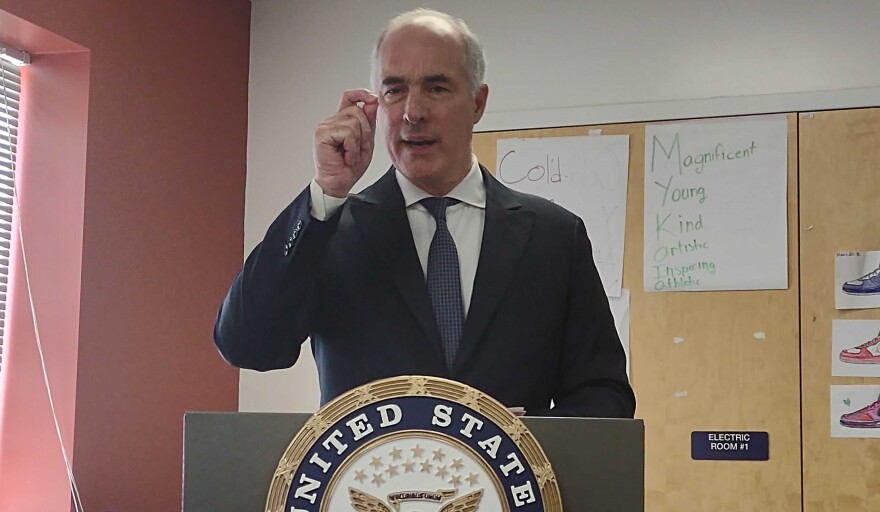EASTON, Pa. — U.S. Sen. Bob Casey accused major American industries of price gouging during a stop at the Easton Boys & Girls Club on Thursday, saying Congress needs to take action to protect consumers from corporate greed.
Over the past year, Americans have held a grim view on the economy despite several positive indicators such as low unemployment, a thriving stock market and falling inflation.
But stubbornly high costs of everyday essentials such as milk and chicken have stretched the pocketbooks of consumers.
Casey, D-Pa., has partially pinned the problem on "greedflation." The theory contends that when businesses raise their prices far more than necessary, it can worsen inflation. Its supporters argue that businesses overreacted at the peak of the pandemic, raising their prices more than necessary. But instead of lowering prices when they realized it wasn't necessary, the companies pocketed the excess profits.
The Kansas City branch of the Federal Reserve Bank has given some credence to the argument. Its economists reported in a January 2023 study that markups may have contributed to half of the inflation increase in 2021.
"This greedflation problem is real. We've got to talk about it, expose it and then do something about it."U.S. Sen. Bob Casey, D-Pa.
Casey has taken the argument to another level. In four reports released since November, Casey has noted that corporate profits rose by 75% between July 2020 and July 2022, five times faster than the rate of inflation. Americans would accept higher prices if businesses are contending with rising production costs, Casey said. But these record profits are outpacing all other factors, he said.
"If you're a big company that jacked up your prices, don't tell me and don't tell that family who's paying through the nose every week when they go to the grocery store... that somehow all our prices went up and we had to raise our prices. That's a lot of you-know-what," Casey said.
In his office's reports, Casey cited the following as evidence of greedflation:
- The Department of Justice has initiated a lawsuit against the entire chicken, turkey and pork industry, alleging it's engaging in price-fixing practices. Some of the biggest names in the sector, including Tyson and Pilgrim's Pride, have been ordered to pay hundreds of millions of dollars in fines for illegally conspiring against consumers.
- Kimberly-Clark, the maker of Huggies diapers, reported last year that the cost of making its products fell $75 million. Rather than passing the savings on to consumers, the business banked $168 million in operating profits in the third quarter.
- JPMorgan, Wells Fargo and Bank of America combined to make more than $9 billion in "junk fees" such as overdraft fees, ATM fees and late fees.
"This greedflation problem is real. We've got to talk about it, expose it and then do something about it," Casey said.
Mounting evidence
The concept of greedflation has come a long way in recent years. Once derided as a fringe theory, economists across the globe are treating it more seriously. Officials with the European Central Bank noted last spring that price gouging appeared to have worsened inflation.
Local officials said they've seen firsthand how the high costs have left families across the region struggling. The Easton Boys & Girls Club expanded its food pantry service to two days a week earlier this month, said Dean Young, its executive director. Between 32 and 51 families are taking advantage of the service, more than during the peak of the pandemic, he said.
And Keela Vincent, executive director of Family Connection of Easton, said her operation has seen a similar jump in demand for food and shelter. Many of the federal aid programs that helped families make it through the pandemic have ended, leaving them without resources even though costs remain elevated. It's forced families to make difficult decisions — sometimes leaving young women unable to afford feminine hygiene products.
"I think it's important for everybody to think about how some of the things in this report impact families on a day-to-day basis," Vincent said.
Next steps
It remains to be seen if there's any consensus in Washington to tackle price gouging. Casey was one of several senators who introduced a bill Thursday that would empower the Federal Trade Commission and state prosecutors to stop companies charging grossly excessive prices. The bill's language was not immediately available, but a Casey news release said it would provide the FTC with an additional $1 billion to fund enforcement.
The bill has a nearly identical name to one Casey supported last year that specifically would have allowed the FTC and state attorney generals to prosecute oil companies charging grossly excessive prices. That bill has yet to advance in the Senate.
Casey, who is up for re-election this year, said he intends to make greedflation a pillar of his campaign. He's widely expected to face Republican Dave McCormick, a former hedge fund CEO, in the November election. Casey said voters need to ask themselves which candidate they think is going to stick up for consumers and which will work to protect corporate tax breaks.
"They're going to hear about this morning, noon and night. I tell them to saddle up and get ready because we're going to talk about this until we're blue in the face," Casey said.


